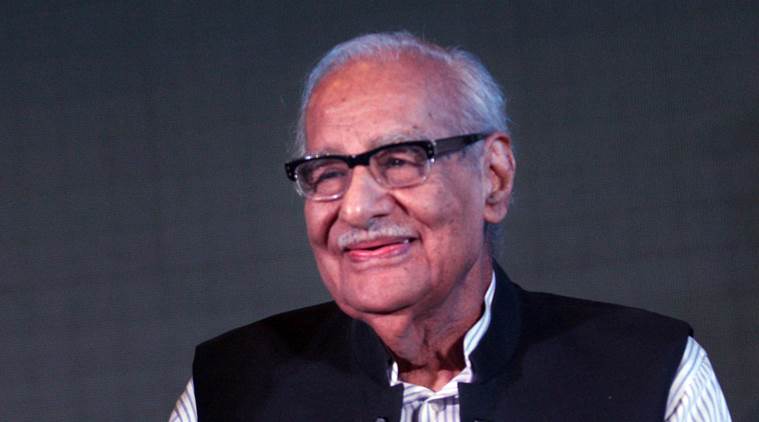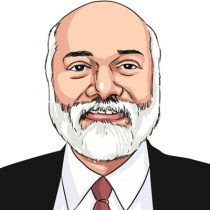Kuldip Nayar By KP Nayar
I was an unintended beneficiary multiple times of Kuldip Nayar’s fame and reputation because I am his namesake, a Malayali journalist who spells his surname just as Kuldip Nayar did.

Kuldip Nayar was among the journalists who had staunchly opposed the Emergency and was jailed during that period. (Express photo by Neeraj Priyadarshi)
I was an unintended beneficiary multiple times of Kuldip Nayar’s fame and reputation because I am his namesake, a Malayali journalist who spells his surname just as Kuldip Nayar did. Although many journalists of my generation, including several colleagues during the years that I worked for this newspaper, were mentored by Kuldip Nayar, I only had a nodding acquaintance with him.
On September 11, 2003, I received a message from Judea Pearl, father of Daniel Pearl, the Wall Street Journal reporter, who was kidnapped and beheaded by terrorists in Pakistan nearly five months after the 9/11 attacks. Danny’s father invited me to speak at a conference in New York organised by Seeds of Peace, a New York-based group which seeks to inspire and cultivate future generations of global leaders in communities divided by conflict.
That year, the Daniel Pearl Foundation was hosting Indian and Pakistani teenagers for a Seeds of Peace bi-annual conference in New York, along with boys and girls from Israel and Palestine as well as Turkey and Greece, all countries affected by conflict.
Looking back, I realise that I accepted the invitation because I was impressed by the work of Seeds of Peace, whose advisers include former US Presidents Bill Clintonand George H W Bush, Queen Noor Al Hussein of Jordan and Sa’eb Erekat, Secretary-General of the Palestine Liberation Organisation.
On the morning of October 14, 2003, a limousine picked me up from the Hilton on New York’s Times Square, where the organisers had put me up, and took me to a sprawling museum complex in Manhattan, the venue for the conference. Judea Pearl, who was at the door to receive me, remarked as soon as we met that he had assumed I was much older than I looked. I joked about looking young at my age. The penny dropped only when he praised my work for peace between India and Pakistan. The Daniel Pearl Foundation and Seeds of Peace had mistaken me for Kuldip Nayar — who was 30 years older — and had invited me to New York on the assumption that I was the renowned journalist who was also famous as South Asia’s foremost peace activist.
A year ago, I was invited to Fort Lauderdale for three days of events associated with a philanthropic contribution of $200 million for medical education in Florida by two Indian American doctors in Tampa, Kiran Patel and his wife, Pallavi. The couple knew for sure who I was. But as the proceedings began in Fort Lauderdale, I was introduced at NOVA Southeastern University as a “fearless journalist who had done some remarkable things”. Not being very modest by nature, I acknowledged such praise. It was only the next day when one of the organisers asked about the time I had spent in jail during the Emergency it dawned on me that some people had mistaken me for Kuldip Nayar.
When Prime Minister Atal Bihari Vajpayee travelled to Lahore in 1999, he insisted that Kuldip Nayar and Dev Anand should stay with him at the Punjab Governor’s mansion. I was at the Avari hotel along with the media and some Indian officials. The Pakistanis had thoughtfully designated Avari as a diplomatic compound for the duration of our visit so that alcohol could be served there by the Indian High Commission. That made Avari a rare, if temporary, watering hole in Lahore for many prominent Pakistanis. Along with visiting Indians, they liberally partook of the High Commission’s hospitality. Kuldip Nayar’s friends, who are legion in Pakistan, found my name registered as a guest at the hotel: Nayar as surname with the initial K as in Kuldip.
The phone in my room did not cease ringing at night; many callers angry, others hurt, that their “Kuldip saheb” had not got in touch although he had been in Lahore for an entire day. I left Lahore convinced that the peace activist from New Delhi was more popular in Pakistan than his prime minister who had opened a new page in India-Pakistan relations with his bus diplomacy.
There are more episodes of this kind, but one had an exceptionally happy ending. In the 1990s, I used to appear regularly on BBC World Service. When BBC did not pay me for about nine months, I spoke to Bush House in London only to be told that no payment was pending. BBC later discovered that all my cheques had gone to Kuldip Nayar’s address. Of course, I got all my dues in a few weeks with an apology.
The writer is a senior journalist
For all the latest Opinion News, download Indian Express App
More From K P Nayar
- Why getting televangelist Zakir Naik back will be an uphill task for IndiaMalaysian Prime Minister Mahathir Mohamad said Tuesday that Malaysia does not ‘easily follow the demands of others’; and it does not want ‘someone to become…
- Atul Malhari Gotsurve: Delhi’s man in Pyongyang is an IFS officerThe new Indian Ambassador was invited by Kim Yong-nam, President of the Presidium of the Supreme People’s Assembly on the ninth day of his stay…
- No conspiracy on the menuWithout doubt, all these honourable men would have walked out of Aiyar’s dinner if any conspiracy was being hatched on that occasion to influence assembly…








































No hay comentarios:
Publicar un comentario